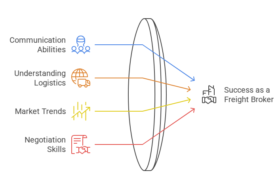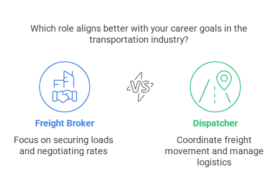BEST PRACTICES FOR WORKING WITH FREIGHT BROKERS
1. Understand the Broker’s Role
Having a clear understanding of what freight brokers do – and what they don’t – is crucial to getting the most benefit from the relationship. A freight broker is a licensed intermediary who works to link up shippers with qualified carriers when they have products to move. The specifics of the deal are worked out with the help of the broker, and the status of loads is communicated back to the businesses and individuals involved in the transaction through the broker. This coordination is often vital to getting loads delivered successfully, in the budget, and on time.
2. Check Their Legitimacy
Freight brokers have to meet several requirements in order to operate their businesses legally. This includes an initial license, registration with the FMCSA, and a freight broker bond or trust. If you want to have the best outcome in working with a freight broker, check that they have met these requirements and are in good standing.
3. Make Sure They Have Experience and Training
Although freight broker training is not a requirement for getting a license, the broker you choose should have some degree of experience in the business and formal education in the industry. Freight brokers can take courses online or in-person through a variety of reputable freight broker training schools. The ones who are the most successful and the best equipped to help you with your business have gone through this process.
4. Let Them Handle the Legal Requirements
Part of the reason shippers and carriers work with freight brokers is their ability to manage the legal legwork necessary to move loads. There are a handful of federal and state regulations that impact your business, ensuring shipments are completed correctly, including bonding and licensing. The right broker takes this weight off your shoulders and manages the legal requirements on your behalf. This can save you time and money, a lot of frustration, and ensure your shipments are successful each time.
5. Communicate Clearly (and Often)
Like other intermediary businesses, freight brokers need to be in the loop when it comes to loading movements. Shippers and carriers need to take the time to communicate their goals with the broker, upfront, and continue to update them with relevant information along the way. Brokers appreciate transparent, timely communication, so keep this in mind. A logistics management solution geared to the needs of freight brokers, logistics service providers and 3PLs and 4PLs, can be invaluable.
6. Getting the Best Shipping Rates
One of the benefits of working with a licensed and trained freight broker is the ability they have to get the best possible shipping rates. Brokers have an in-depth knowledge of the industry, as well as the relationships with other parties involved in the shipping process. Let them work their magic through their business connections to help get you the best possible rates.
7. Resolving Issues
A freight broker is also meant to help troubleshoot when problems in shipments or logistics arise. With their training and connections, freight brokers can navigate through most issues faster and with more efficient outcomes than shippers and carriers. If you’re considering using a freight broker, remember that this is part of their role and let them manage any issues that come up.
8. Cultivate the Relationship
Having a strong business relationship with your freight broker is a necessary part of the process. Brokers work with many different shippers and carriers on any given day, and word of a damaged relationship gets around quickly. Because the transportation industry is tight-knit, it is necessary to keep relationships with brokers as a top priority, treating them with the respect they deserve for helping your business run smoothly. Mutual respect and mutual trust will go a long way to ensuring a smooth and productive long term relationship.
9. Choose Based on Business Needs
Licensed freight brokerages come in many different shapes and sizes, from large corporate-like operations to small, locally-owned businesses. Each has its merits. Big businesses in freight have access to resources, can take on new partnerships with shippers and carriers daily, and they can let them go just as fast. Smaller businesses may not be able to handle as much business day today, but they may have more of a focus on the relationship aspect of each load. Be sure to think about your business needs and select your broker based on how they fit in.
10. Be Willing to Adapt
Finally, working with a freight brokerage business requires adaptability. Over time, business models and needs may change, meaning the broker you worked with for years may no longer be the best fit for you or your customers. If that’s the case, be willing to adapt, and quickly. Take into consideration the tips above so you can choose your next freight broker relationship wisely.
Source: https://supplychainbeyond.com/10-best-practices-for-working-with-freight-brokers/
STARTED FOR ONLY $99
www.freightbrokerscourse.com
15% OFF Packages above Basic.







